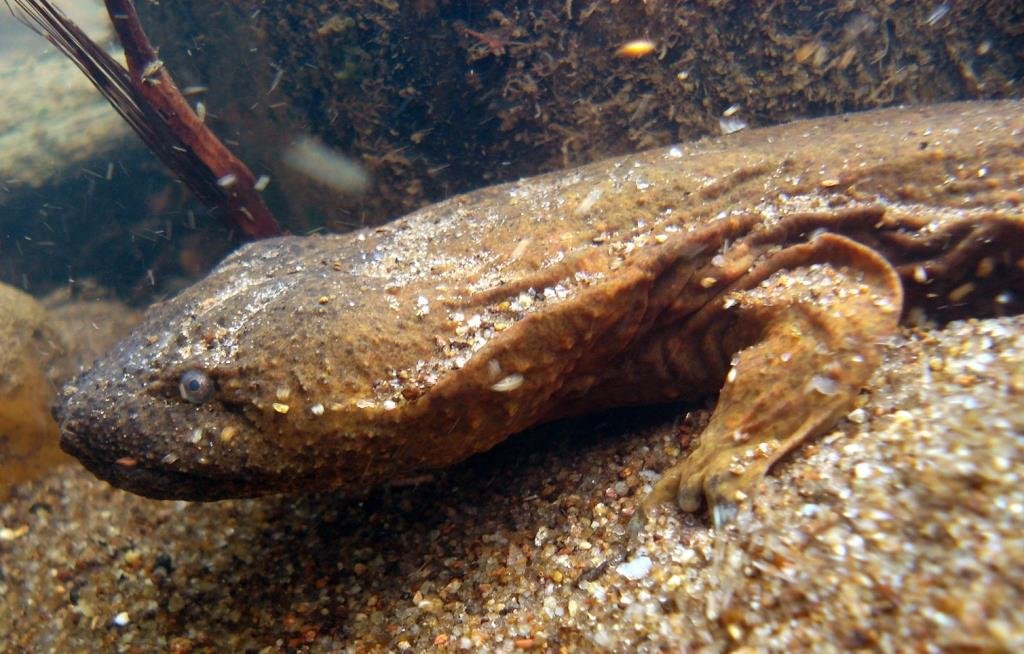See a Hellbender? The Wildlife Commission Wants to Know
RALEIGH, NC (March 27, 2018)…Biologists with the N.C. Wildlife Resources Commission are asking the public, in particular anglers, to report any sightings of hellbenders (“water dogs”) to the agency.
Reported sightings are an important part of a long-term inventory and monitoring project for hellbenders that agency staff, along with partners, began in 2007. They want to learn more about where hellbenders—gigantic, aquatic salamanders averaging 16 to 17 inches in length—are located and how their populations are faring.

Hellbenders are found in fast-moving, clean mountain streams in western North Carolina. Because they breathe through their skin, hellbenders are sensitive to poor water quality, and are considered a “bioindicator,” or a species that can tell biologists about degrading environmental conditions when conditions first start changing.
Hellbenders were once common but have disappeared throughout much of their habitat, due mainly to declining water quality and habitat degradation, and to a lesser degree to persecution from anglers who mistakenly think that hellbenders decrease trout populations.
Although they may occasionally go after a trout on a line or stringer, looking for an easy meal, hellbenders eat mainly crayfish according to Wildlife Diversity Biologist Lori Williams, who has done extensive work on hellbenders. “They may also eat unsuspecting minnows and scavenge for dead fish, discarded bait or other dead animals. However, fish can be bigger predators of young or larval hellbenders than hellbenders of fish.”
Williams wants to dispel other myths people might have about one of North Carolina’s largest salamanders, which is also called “water dog,” “snot otter” and “Alleghany alligator.” One prevalent myth is that hellbenders are poisonous, venomous, toxic or harmful.
“Wrong on all levels,” Williams said. “Although hellbenders are large, slimy and can be scary looking, particularly if you’ve never seen one before, they are nothing to fear. They are harmless and not poisonous, venomous or toxic. And while they may try to bite if picked up, they will leave you alone, if you leave them alone.”
Leaving them alone is also the law. Hellbenders are listed as species of special concern in North Carolina. Because of this listing, it is illegal to take, possess, transport or sell a hellbender or to attempt to do so. A violation is a Class 1 misdemeanor, which can result in a fine and up to 120 days in jail.
Anyone who finds a hellbender is asked to leave it alone but to note the location (physical location or GPS coordinates) and take a photo, if possible and email that information to Williams at lori.williams@ncwildlife.org. If anglers happen to catch one on hook and line, they should carefully remove the hook if it is safe to do so without harming the animal or cut the line as close as possible and return it back to the water. People also can call the Commission Wildlife Interaction Helpline (866) 318-2401 and provide details of the observation.
Learn more by visiting the Commission’s hellbender webpage.
About the N.C. Wildlife Resources Commission
Since 1947, the N.C. Wildlife Resources Commission has been dedicated to the conservation and sustainability of the state’s fish and wildlife resources through research, scientific management, wise use and public input. The Commission is the state regulatory agency responsible for the enforcement of fishing, hunting, trapping and boating laws and provides programs and opportunities for wildlife-related educational, recreational and sporting activities.
Get N.C. Wildlife Update — news including season dates, bag limits, legislative updates and more — delivered free to your Inbox from the N.C. Wildlife Resources Commission.
